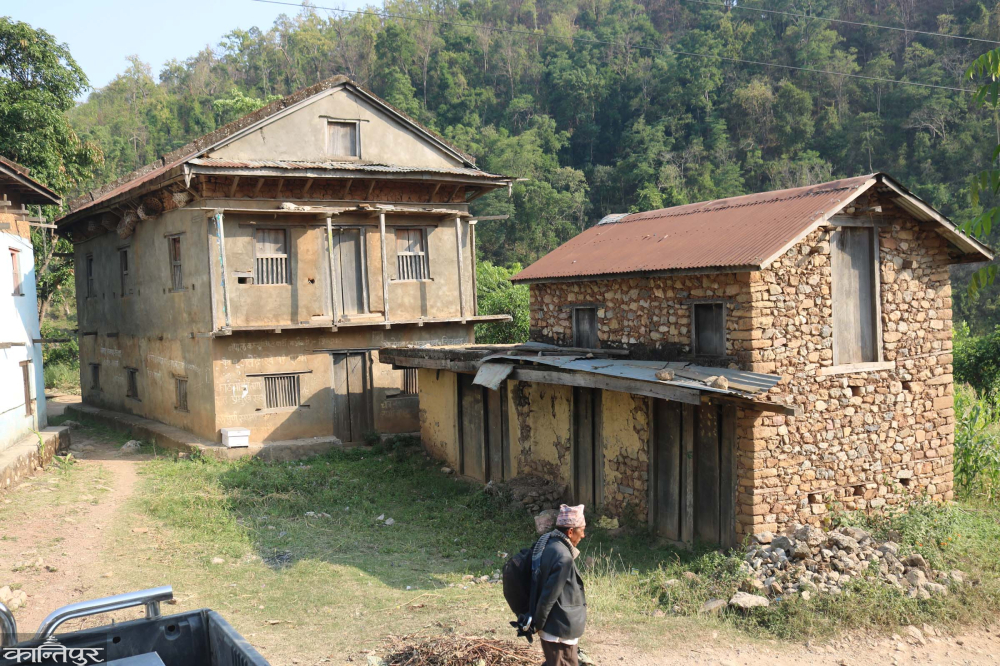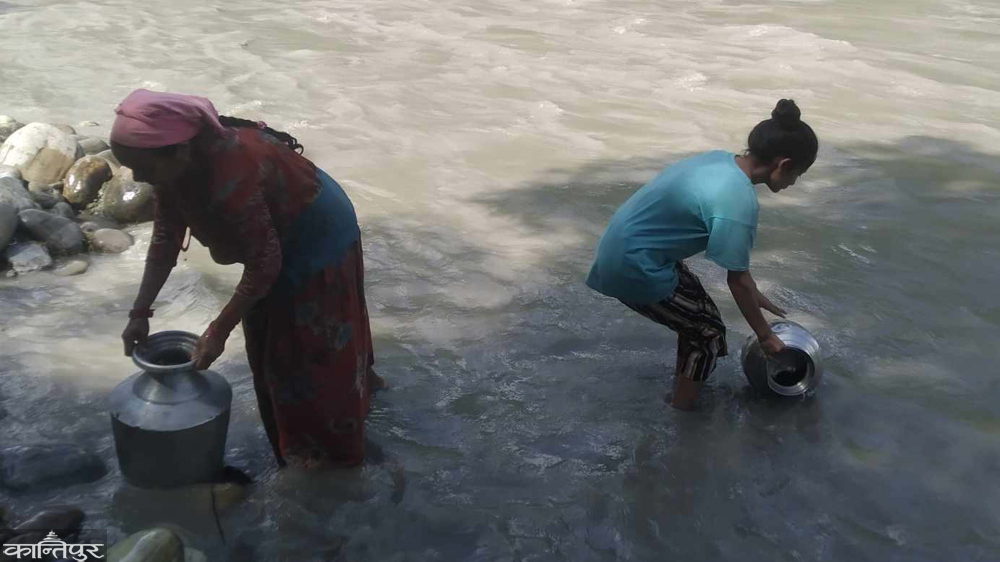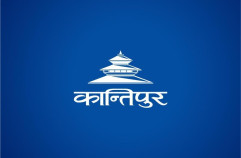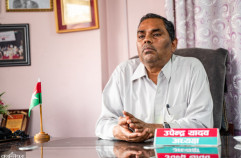We use Google Cloud Translation Services. Google requires we provide the following disclaimer relating to use of this service:
This service may contain translations powered by Google. Google disclaims all warranties related to the translations, expressed or implied, including any warranties of accuracy, reliability, and any implied warranties of merchantability, fitness for a particular purpose, and noninfringement.


About 200 families lived in Surkhet Choukune Rural Municipality-5 Rekcha, where only about 80 families lived a decade ago. The reason why the village is falling apart every year is the extreme lack of food and water. "There are 10/12 wells in the village, but none of them can fill more than 2 gallons of water a day," said 80-year-old Nanda Jaisi, "otherwise we can't even drink water to quench our thirst." . He complains that it is difficult to supply a family of 10 people with 2 grams of water, so he worries about water day and night.



Reccha has 18 wells . Out of that, 12 wells dried up in February. Jiten BC, a local youth, said that as the drought is increasing, the wells are gradually drying up, so the locals migrate seasonally to places like Lagam, Pokhre, Kailali in the neighboring district.
'Most of the locals have houses in two places,' he said, 'Those who have 2 houses live in the village only during the rainy season, but those who have houses in one place have to cook, drink and clean with only 2 gallons of water.' A watchman has been kept in Rekcha to monitor the flow of water . Chowkidar himself has been applying two gallons of water per house. Locals have been giving one bushel of wheat per house to the chowkidars who are posted from January to June.
 3 years ago, the construction of LIPT water supply project was started in Rekcha with the investment of 1 crore 26 lakh rupees by the provincial government . But the project is stalled due to lack of electricity. Village Chairman Khadak Wik said that the water supply project has been stalled due to the lack of a road to take the transformer of electricity to the spring. "Roads and electricity facilities are also necessary for this plan," he said. - 2 Bhadra Bahadur Gharti's family of 5 from Kochatte migrated to Sallibazar, center of Bangadkupinde municipality 6 years ago. Soon after, the family of his brothers Govinda and Parashuram also left the village. "At present, there is only a small settlement of people coming from Kochta," said Bhadra Bahadur, "We suffered a lot from the water in the village, so there was no option to sell the house and leave." There are those who have migrated from the slums.
3 years ago, the construction of LIPT water supply project was started in Rekcha with the investment of 1 crore 26 lakh rupees by the provincial government . But the project is stalled due to lack of electricity. Village Chairman Khadak Wik said that the water supply project has been stalled due to the lack of a road to take the transformer of electricity to the spring. "Roads and electricity facilities are also necessary for this plan," he said. - 2 Bhadra Bahadur Gharti's family of 5 from Kochatte migrated to Sallibazar, center of Bangadkupinde municipality 6 years ago. Soon after, the family of his brothers Govinda and Parashuram also left the village. "At present, there is only a small settlement of people coming from Kochta," said Bhadra Bahadur, "We suffered a lot from the water in the village, so there was no option to sell the house and leave." There are those who have migrated from the slums.
Kamala Gharti of Kochatte said that being a hill settlement, she has been suffering from water shortage for generations. "When there is a shortage of water, we are forced to drink," she said, "For years, we have to get up in the middle of the night and go an hour down to the Ghatikhola spring to fetch water." The water is spent in moving. He says that 8/10 families leave the village every year due to lack of water.
Due to lack of drinking water, most of the Lekali and hilly settlements of Karnali have started to become uninhabited. According to the National Census - 2078, only 130,000 families out of 366,37 households in Karnali enjoy regular drinking water facilities. Prem Jaisi of Bheri Municipality-8 Kuduka of Jajarkot said that food production is also decreasing due to lack of water. According to him, about 800 families of the village have been suffering from water shortage for years. As the water of the boring scheme running in the village does not reach, they have to drink the contaminated water of the Bheri river . According to him, due to lack of water, nearly 200 families have migrated elsewhere in a decade. "The Bheri river flows 50 meters below the village, we have been suffering for years. Due to the lack of irrigation, when the crops stopped growing, it became difficult to get rid of the weeds," he said, "how to irrigate the farm when it is difficult to get drinking water?" In Chakhlemela located in the rural municipality, it is difficult to get a small person to ask for water . Animal husbandry is the main occupation of nearly one and a half hundred households in the village. They can give milk, curd, mohi to the local visitors but it is difficult to get water. "There is no other problem in the village, because it is a hill settlement, there is always a problem with water," said Bal Bahadur Pun, a local, "You walk for half an hour and bring one gagri in the evening and morning, do you use it yourself or give it to the guests?" About 50 houses have migrated during the year . He said that those who migrated from the
village went to the Bheri riverside markets including Simli, Garayla, Hasibang and other settlements of Aul. Due to lack of water, farming in the village is dependent on rainwater, while the water supply scheme operated in the village is always closed in winter and summer after the roots dry up. 'The Saniveri River is flowing below the village,' he said, 'We are cousins from generation to generation, bringing water from the river to the village through lift would stop migration, our children and grandchildren would be happy.' Water facility is available. Also, about 96.5 percent of the families have not been tested for water hygiene. Out of 3 lakh 66 thousand 37 households, 2 lakh 35 thousand households have to consume drinking water from alternative sources, while 4 thousand 276 households still have to use river water every twelve months.
 Even in the villages of Aunal, even though the water source is near, the locals are deprived of drinking water . The Babai River is flowing near the house of 55-year-old Bholaprasad Budha of Ghuiyabari, Kalimati Rural Municipality-7, Salyan. He has a 2 bigha farm at a distance of 40/50 meters from the Babai river. But in the absence of irrigation facilities, the fields become barren in winter. He said that there is always a shortage of drinking water in the village where there are about 50 households. "Leaders do politics by showing this river to bring water, electricity and irrigation," he said. They have left the village. Nutritionist Narendra Devkota said that the availability of safe drinking water will help in sanitation and healthy living and will help control water borne diseases like diarrhoea, cholera, typhoid and waterborne diseases. According to him, this will help in reducing the child mortality rate and maternal mortality rate as well as increasing the average life expectancy. "Residents here do not get to drink clean water," he said, "other facilities have become a foreign matter." Due to lack of budget, about 1,600 drinking water schemes in Karnali have been stalled, according to the Ministry of Water Resources and Energy Development of the state government.
Even in the villages of Aunal, even though the water source is near, the locals are deprived of drinking water . The Babai River is flowing near the house of 55-year-old Bholaprasad Budha of Ghuiyabari, Kalimati Rural Municipality-7, Salyan. He has a 2 bigha farm at a distance of 40/50 meters from the Babai river. But in the absence of irrigation facilities, the fields become barren in winter. He said that there is always a shortage of drinking water in the village where there are about 50 households. "Leaders do politics by showing this river to bring water, electricity and irrigation," he said. They have left the village. Nutritionist Narendra Devkota said that the availability of safe drinking water will help in sanitation and healthy living and will help control water borne diseases like diarrhoea, cholera, typhoid and waterborne diseases. According to him, this will help in reducing the child mortality rate and maternal mortality rate as well as increasing the average life expectancy. "Residents here do not get to drink clean water," he said, "other facilities have become a foreign matter." Due to lack of budget, about 1,600 drinking water schemes in Karnali have been stalled, according to the Ministry of Water Resources and Energy Development of the state government.
Karnali has about 26 percent snow area . Where 1 thousand 459 glaciers occupy an area of 1 thousand 23 square kilometers. According to the Provincial Planning Commission, about 60 percent of the 500 km length of Karnali, the longest river in Nepal, is in Karnali. But all the water flowing from Karnali is being wasted. Kalanidhi Poudel, Joint Secretary of Water and Energy Commission said that the water of 264 km long Bheri river and 68 km long Tila river is also being wasted in Karnali province. According to him, it is necessary for the state government to protect the water of Karnali by creating an appropriate water policy.
Big plans to use water in Karnali have been stalled for a long time. Although the World Bank has secured nearly 6 billion rupees for the Veri Pumping Project to provide adequate drinking water facilities in the provincial capital Birendranagar, the planning work has been repeatedly pushed back due to the lack of completion of detailed engineering design, preliminary environmental testing (IE) and other studies. Due to lack of work in very pumping, the annual amount is being frozen. The federal government had allocated Rs 2 crore in the previous year and Rs 6 crore in the last financial year. Last year, Rs 50 crore allocated by the state government was returned without being used.
According to Rishi Khanal, a member of the State Planning Commission, there is very little budget allocation in the drinking water sector in Karnali due to the allocation based on population. According to him, about 90 million rupees have been allocated for drinking water this year. According to him, water supply problems in Karnali are serious due to lack of distribution-oriented settlements, geographical situation, unorganized road construction, climate change, forest destruction, settlements above and below springs, where water supply plans have been stalled for years.
Climatologist Kamal Sharma said that the problem of drought is increasing even when there is less rain from the sky due to climate change . According to the census, 88 percent of the households in Karnali have access to drinking water, but there is a shortage of drinking water in most of the district headquarters. Due to the lack of drinking water in Karnali, it has also had a negative impact on the human development index.
Navinchandra Adhikari, secretary of the Ministry of Energy and Water Resources, said that there is a water problem in Karnali due to lack of budget, timely authorization problem, non-adherence of consumers in the water supply plan, lack of maintenance, weak structure and lack of management system in the plans. "Most of the settlements are in the hills, since the water source is below the village, there is no alternative to drinking water," he said. Due to the scattered settlements, there is a twelve-month water shortage in all the settlements.
प्रकाशित : चैत्र १४, २०८० ११:१८

















